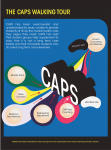May is Mental Health Awareness month. With Snapchat filters and student programming focused on mindfulness and suicide prevention, it would be easy to believe mental health is a priority at UCLA.
That is, unless you’re seeking long-term treatment.
The UCLA Counseling and Psychological Services center is the on-campus provider for mental health services. According to its website, it provides “short-term, high-quality” treatment for students.
But calling it short-term treatment is an understatement, and it’s definitely not high-quality. CAPS provides a maximum of six appointments each academic year for students covered by University of California Student Health Insurance Policy and three for those without. Students whose psychological needs are not met in a mere six sessions can be referred to outpatient treatment, covered by Anthem providers.
The American Psychological Association indicates that, on average, 15 to 20 sessions are required for 50% of patients to recover. At the bare minimum, patients need 12 to 16 weekly sessions to show significant improvement. Most patients need 20 to 30 sessions over six months to achieve more complete remission.
So even calling CAPS’ services “short-term” is generous.
The shortcomings of on-campus treatment options are made worse by CAPS’ negligence to ensure off-campus providers treat students adequately and in a timely manner. Instead, the center continues to shuffle patients through its short-term care to other providers, without indication that they are able to fully complete treatment.
One such provider is Acacia Counseling & Wellness in Westwood. Publicly, CAPS executive director Nicole Green said Acacia is not a formal partner to CAPS.
“They are one group practice office in our area we refer to,” Green said. “Given their proximity to our campus, many students seek services there. However, we ask that all of our clinicians provide students with at least three referral sources so to not perceive Acacia is their only option.”
Most other off-campus providers are inaccessible, making Acacia the obvious choice for students who don’t want to pay exorbitant out-of-pocket appointment fees and high transportation costs. The Acacia appointment request form even asks for students’ UCLA ID number and their UC SHIP information.
Moreover, navigating CAPS’ provider database, which allows students to search for an in-network provider and specify the kind of treatment they are looking for, is hardly a simple task. The database is often out of date – some providers’ profiles were not updated for over a year. Acacia is nearby and open, making it one of students’ most attractive options.
And yet, in an email sent to prospective patients, Acacia indicated wait times are now as much as five to six weeks as the center is at full capacity. Acacia’s main purpose is to serve students in recognition of the fact that CAPS is overflowing. It’s done this at several other campuses, such as UCSB and UCSD.
Long wait times for few appointments are at the root of CAPS’ failure to help students. The fact that private practices like Acacia are being clogged up too is far worse, since students are going further out of their way after initiating treatment – only to be shut down again.
It’s already hard enough for students to recognize if they need the assistance of a mental health professional. Long wait times and few appointments only further deter students from seeking help in the first place.
Green indicated she was not aware of Acacia’s lengthy wait times, despite also saying that the CAPS coordinator polls community clinicians in its database weekly to determine which providers have openings.
Either the CAPS coordinator is not fulfilling the job description, or all of the off-campus providers are overfilled and students are continuing to be pushed into these nonexistent off-campus programs – and both are unacceptable.
The long wait times are not Acacia’s fault: It’s a private practice with no obligation to serve just UCLA students. Rather, its congestion is just a symptom of a larger problem of insufficient psychotherapy options for students.
In other words, it’s merely dealing with CAPS’ mess.
Additionally, the negligence of CAPS in understanding the wait times of community providers while acting like it’s easy for students to find an off-campus provider reflects a deep-seated disregard for the reality students face, like how difficult it is for them to contact these providers or set up appointments with providers they like who are covered by UC SHIP.
And instead of backing down or acknowledging the shortcomings of its own services or its providers, CAPS acts like students are the ones to blame for not being able to navigate this maze. But in reality, students face obstacles at every turn. That cavalier mentality only proves UCLA and CAPS’ administrators care little if students are treated fully – only if they’re no longer taking up a seat at the CAPS center.
Until the university acknowledges these flaws, students will have to to deal with their mental health issues via Snapchat filters and once-a-year events.
